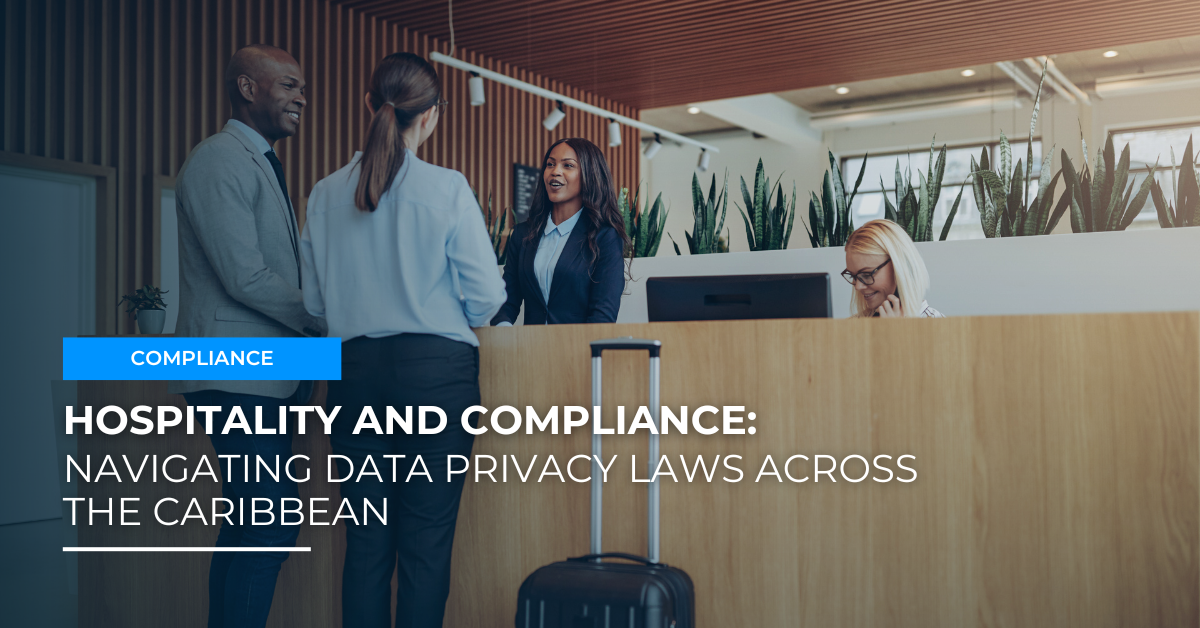As the Caribbean welcomes another bustling tourism season, hotels and resorts are welcoming thousands of international guests. While attention naturally shifts to bookings and service delivery, an equally pressing concern is emerging: compliance with data privacy laws that now govern nearly every aspect of guest interaction.
Across the region, countries such as Jamaica, Barbados, Bermuda, and Trinidad and Tobago have introduced data protection legislation. Some laws are partially enforced, while others are fully enforced. Still, the signal is clear: regulators are shifting from education to enforcement. For hospitality providers, the message is simple: compliance is no longer optional.
Hotels and resorts collect and process a vast amount of personal data. From booking details and passport scans to spa preferences and credit card information, nearly all of it falls under the scope of privacy laws. This includes not only the local Data Protection legislation, but also global laws that carry extraterritorial implications. Hotels across the region that host guests from jurisdictions in the European Union, the United Kingdom, or California may still need to align with standards set by the General Data Protection Regulation (GDPR). While these laws may not always be directly enforceable, they have effectively set a global benchmark that regional hospitality businesses are expected to meet.
Despite the urgency, our on-the-ground experience has revealed several persistent compliance failures across the sector. Many hotels still rely on outdated systems, like paper-based credit card forms, unencrypted spreadsheets, or even WhatsApp for guest communications. Others operate without valid consent mechanisms for marketing, fail to train staff on data protection or have no clear policies for the retention or deletion of sensitive guest information.
Another common gap, especially among mid-sized or family-run properties, is the lack of a designated Data Protection Officer (DPO). In many cases, resorts continue to store sensitive guest information in shared digital folders or rely on printed records without clear protocols for secure disposal. These practices significantly increase the risk of regulatory penalties, reputational harm, and operational disruptions. Increasingly, non-compliance is not just a legal risk but a reputational one, with data breaches and mishandling incidents making headlines and eroding customer trust.
Although specific legal requirements may differ from country to country, the core compliance obligations remain broadly consistent:
Collect valid, informed consent, especially for marketing communications.
Securely store and process personal data, including sensitive information like health records.
Appoint a DPO or outsource the function if internal capacity is limited.
Train frontline staff on how to handle and protect personal information.
Vet all third-party service providers, including booking platforms and Customer Relationship Management (CRM) vendors, to ensure compliance.
Establish procedures for handling data subject requests such as access, correction or deletion.
In addition, the sector must prepare for the implications of cross-border data flows. Spa and aesthetic services, for example, often collect health-related data which requires an elevated level of security. The ability to respond to guest inquiries regarding their data is no longer a courtesy, but a requirement.
Uncertain about where to start?
A privacy audit or gap assessment is often the most effective first step. This initial review helps identify areas of non-compliance and highlights the most urgent actions needed. The following checklist offers a practical starting point:
Conduct a privacy audit to establish your current standing.
Map your data collection practices and build a formal data inventory.
Review and update consent forms to align with current legislation.
Train staff on privacy awareness and best practices for data handling.
Review third-party vendor contracts to ensure data protection obligations are clear and enforceable.
Implement secure storage and disposal procedures for guest data.
Why DPO-as-a-Service Is a Smart Strategic Move
For those without the budget to hire full-time privacy personnel, outsourcing the DPO function is a practical and strategic solution. Symptai’s DPO-as-a-Service offering provides expert guidance and continuous oversight, allowing you to focus on delivering an exceptional guest experience.
There is growing recognition that data privacy is not just a legal requirement but a source of competitive advantage. Some of the most respected hotel brands in the region are using privacy compliance as a pillar of their guest value proposition to demonstrate transparency, accountability, and care in how they manage personal information.
Governments are also issuing more detailed guidance on hospitality obligations, with emphasis on data minimization, transparency, and respect for guest rights. Being proactive not only reduces risk but strengthens your brand trust.
The era of “let’s just wait and see” is behind us. With regulators stepping up enforcement and guests becoming increasingly conscious of how their data is handled, compliance can no longer be treated as a formality. For hotels, strong data privacy practices are essential to safeguarding both their guests and their long-term business reputation.
For hospitality businesses seeking a clear path forward, Symptai offers structured audits, DPO support, and tailored guidance grounded in global best practices and cultural realities.
To learn more or to schedule a Privacy Audit, contact us today. Protecting guest data could be the smartest investment your property makes.









